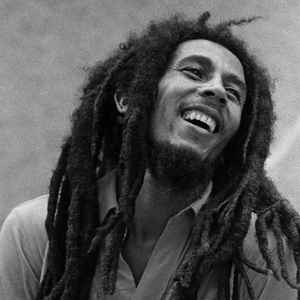Bob Marley

Robert Nesta Marley, OM (6 February 1945 – 11 May 1981)
Given the image of him as a smiling, joint-smoking peacenik that has proliferated since his death in 1981, it’s easy to forget just how angry Bob Marley was. His music spoke to colonialism (“Small Axe”), poverty (“Them Belly Full [But We Hungry]”), the necessity of achieving political agency (“Get Up, Stand Up”), and the challenge of exercising it (“Burnin’ and Lootin’”) with a righteousness and frustration that made him as much a figurehead to punk rock as to the reggae he helped export to the world. He may have been ambivalent about politics (he once said it was pretty much the same thing as church—a way to keep people ignorant), but it wasn’t because of their underlying possibilities; it was the way the political system had been twisted by the tyranny and greed of people in power that troubled him. And if his music sounded sweet and made you want to dance, it’s because, as his sometime publicist Vivien Goldman once put it, he knew that if he hooked you with the melody, you’d have to listen to what he had to say.
Born in 1945 in Nine Mile, a rural village about an hour and a half outside Kingston, Marley formed The Wailers with Peter Tosh and Bunny Wailer in his late teens, thickening from cheerful R&B-based ska to the more rhythmically substantive sound of reggae. As firm as his association is with Jamaica, the music he made had a dialogic relationship with a variety of Black styles, including funk (“I Shot the Sheriff,” “No More Trouble”), soul (“No Woman, No Cry,” “Redemption Song”), and even disco (“Could You Be Loved,” “Exodus”)—reggae, you could say, was just his concentration.
Even as he settled into smoother, pop-oriented sounds (1978’s Kaya, 1980’s Uprising), he retained an urgency and sense of struggle that inspired generations of artists to recognize that music, while great for entertainment, can also be the delivery system for something bigger.
